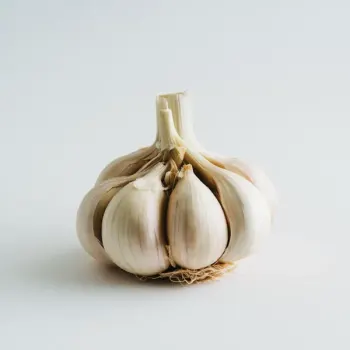Garlic vs Garlic Powder refers to the choice between using fresh garlic, which offers a potent and variable flavor, and garlic powder, which provides a subtler, more consistent taste and is convenient for even distribution in various dishes.

Garlic, known scientifically as Allium sativum, is a pungent and flavorful bulb that has been used in cooking and medicine for thousands of years. It's known for its characteristic cloves that can be minced, sliced, or used whole in a variety of dishes.

Garlic powder is dehydrated ground garlic that offers a convenient and less intense alternative to fresh garlic. It provides a more evenly distributed garlic flavor and is often used in rubs, spice blends, and as a seasoning for dishes where a smooth texture is desired.
The main differences between garlic and garlic powder lie in flavor intensity, texture, and preparation methods. Fresh garlic offers a potent and sharp taste that can mellow and sweeten with cooking, while garlic powder provides a subtler, more consistent flavor. The texture of fresh garlic can add depth to a dish, while garlic powder dissolves and integrates smoothly. Additionally, fresh garlic has a shorter shelf life compared to the convenience and longer shelf life of garlic powder.

Your ultimate Recipe Box, Meal Planner, and Cooking Class all in one
Fresh garlic is excellent for marinades, roasts, and grilling meats. It imparts a robust flavor, especially when used in slivers inserted into meats or crushed in marinades. Expect a burst of pungency that mellows under heat. Garlic powder is ideal for dry rubs, ground meats, and dishes that require even garlic distribution without additional moisture. It offers a uniform flavor profile that is less likely to burn than fresh garlic.
When roasting or sautéing vegetables, fresh garlic's sharpness can enhance the natural flavors, creating a delicious caramelization when roasted. Garlic powder works well in vegetable dishes that are steamed or baked, where a more subtle, evenly distributed flavor is beneficial. It's also great for vegetable dips and dressings.
Fresh garlic is the go-to for sauces and soups where its full-bodied flavor can infuse the liquid base, such as in tomato sauces or broths. Garlic powder is convenient for a quick addition to sauces and soups, especially when a smooth texture is needed or when you're short on prep time.
Both forms of garlic offer nutritional benefits, including vitamins C and B6, and are believed to have anti-inflammatory properties.
| Nutrient | Garlic ( per Teaspoon ) | Garlic Powder ( per Teaspoon ) |
|---|---|---|
| Fat | 0.01g | 0.02g |
| Fiber | 0.1g | 0.3g |
| Sodium | 1mg | 1mg |
| Protein | 0.2g | 0.5g |
| Calories | 4 | 10 |
| Carbohydrates | 1g | 2.3g |
While you can substitute garlic powder for fresh garlic in many recipes, it's not ideal for all. Consider the desired flavor intensity, texture, and cooking method before substituting.
Garlic powder is not necessarily less healthy, but it may have a lower concentration of some nutrients due to the dehydration process.
Store fresh garlic in a cool, dry place with adequate ventilation, and keep garlic powder in a tightly sealed container away from moisture and light.
Yes, you can make garlic powder by dehydrating sliced or minced garlic and then grinding it into a fine powder.
Consider the desired flavor intensity, preparation time, texture, and shelf life when choosing between garlic and garlic powder.